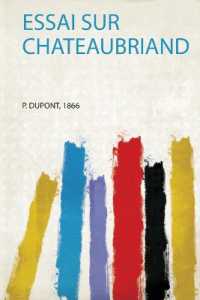- ホーム
- > 洋書
- > 英文書
- > Politics / International Relations
Full Description
From 1967 to 1973, a period that culminated in the socialist project of Salvador Allende, nearly 400,000 low-income Chileans illegally seized parcels of land on the outskirts of Santiago. Remarkably, today almost all of these individuals live in homes with property titles. As Edward Murphy shows, this transformation came at a steep price, through an often-violent political and social struggle that continues to this day.
In analyzing the causes and consequences of this struggle, Murphy reveals a crucial connection between homeownership and understandings of proper behavior and governance. This link between property and propriety has been at the root of a powerful, contested urban politics central to both social activism and urban development projects. Through projects of reform, revolution, and reaction, a right to housing and homeownership has been a significant symbol of governmental benevolence and poverty reduction. Under Pinochet's neoliberalism, subsidized housing and slum eradication programs displaced many squatters, while awarding them homes of their own. This process, in addition to ongoing forms of activism, has permitted the vast majority of squatters to live in homes with property titles, a momentous change of the past half-century.
This triumph is tempered by the fact that today the urban poor struggle with high levels of unemployment and underemployment, significant debt, and a profoundly segregated and hostile urban landscape. They also find it more difficult to mobilize than in the past, and as homeowners they can no longer rally around the cause of housing rights.
Citing cultural theorists from Marx to Foucault, Murphy directly links the importance of home ownership and property rights among Santiago's urban poor to definitions of Chilean citizenship and propriety. He explores how the deeply embedded liberal belief system of individual property ownership has shaped political, social, and physical landscapes in the city. His approach sheds light on the role that social movements and the gendered contours of home life have played in the making of citizenship. It also illuminates processes through which squatters have received legally sanctioned homes of their own, a phenomenon of critical importance in cities throughout much of Latin America and the Global South.








